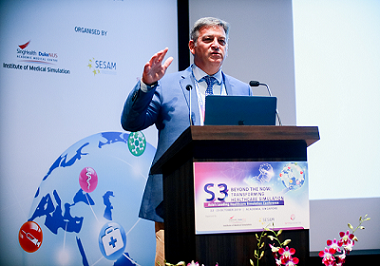Interpretable AI for human-centreed, Holistic Care Learning
Interpretable AI for Human-Centered, Holistic Care Learning
Tim Yuen, Tsuen-Chiuan Tsai,
Innova Medical Technology, Landseed International Hospital, Taiwan
Background
Accurate diagnosis is vital to care quality, making clinical reasoning training essential. Learners often lack hands-on experience, sufficient case exposure, and face cross-cultural communication challenges. Traditional tech-assisted learning has limitations, especially in dialogue realism. With ChatGPT and LLMs, natural and reasoning-capable interactions are now possible, enabling new opportunities in medical simulation and education.
Objective:
To develop training cases on ethical dilemmas and holistic care using V-DxM 2.0, powered by large language models and explainable AI, and to evaluate its educational effectiveness.
Methods:
Using the V-DxM 2.0 authoring platform, a clinical case centered on ethical and holistic care issues was constructed and validated by experts. The scenario was implemented in a faculty development workshop for nursing educators. User satisfaction and feedback on the system’s realism and educational value were collected.
Results:
The case involved a nurse assisting with the placement of an elderly, cognitively impaired mother recently returned to Taiwan from overseas, raising issues such as involuntary admission, medication adherence, and telehealth support—all requiring shared decision-making. Thirty nursing educators from 15 institutions participated. Participants reported that the system provided natural, realistic dialogue, and effectively conveyed the complexity of clinical ethics, holistic care, and shared decision-making. The system was perceived as highly valuable for promoting clinical reasoning and reflection, with high overall satisfaction.
Conclusion:
By integrating LLMs and interpretable AI, V-DxM 2.0 enables highly interactive, transparent, and verifiable training in clinical ethics, patient-centered care, and legal decision-making. It represents a significant advancement in AI-driven medical education.
© 2025 SingHealth Group. All Rights Reserved.














